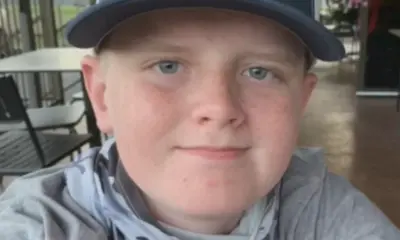Health
US Aid Cuts Lead to Tragic Losses for Malnourished Children in Nigeria

The abrupt suspension of a US-funded nutrition program has led to devastating consequences for families in northeastern Nigeria. Yagana Usman, a mother residing in a camp for displaced people in Borno State, recently lost her infant twin to malnutrition just days after the program was terminated. This tragic event underscores the critical impact of funding cuts on vulnerable populations struggling with acute malnutrition.
Usman, 40, has been living in Fulatari camp in Dikwa for eight years, having fled the violence of the Boko Haram terror group. Tragically, she has already lost six of her 13 children. Her most recent loss occurred in March, shortly after the US Agency for International Development (USAID) halted the distribution of therapeutic food packets essential for treating malnourished children. This decision was influenced by broader cuts to foreign aid initiated earlier this year by the Trump administration.
In March, UNICEF issued warnings about dwindling nutrition supplies for acutely malnourished children in Nigeria and Ethiopia. The agency estimated that nearly 1.3 million children under five in conflict-affected northeastern Nigeria could lose access to lifesaving treatment due to these funding cuts. The implications of such financial restrictions extend beyond Nigeria, as Save the Children reported similar impacts on millions of malnourished children in Kenya, Somalia, and South Sudan.
Funding Cuts Create Dire Consequences
The World Food Programme (WFP) raised alarms about a significant decrease in international donor funding, which has led to reduced food and nutrition assistance for hundreds of thousands of vulnerable individuals in Nigeria. The WFP noted that over 150 nutrition clinics it supported were at risk of closure due to these financial constraints.
A spokesperson from the US State Department confirmed that food assistance to internally displaced people in Borno State had resumed, but the scale of operations is significantly reduced. The spokesperson highlighted that the US had recently allocated $93 million to support nearly one million malnourished children across 13 countries, including Kenya and South Sudan, alongside an additional $52 million to the WFP for emergency food aid.
Despite these efforts, aid workers express concern that many malnourished children, like Usman’s surviving twin, remain at grave risk. Nutrition counsellor Hassan Abubakar Bukar noted that deaths from undernutrition are all too common in the region, stating, “Almost every month, we encounter stories like these.”
Hope Amidst Uncertainty
Usman’s surviving twin, now 18 months old and in need of nutritional treatment, was readmitted to the nutrition program in July. He is currently receiving ready-to-use therapeutic food packets, but the specter of further funding cuts looms large over his treatment. Mercy Corps, which implemented the nutrition program, had to close 42 other programs earlier this year, impacting over 3.6 million people across crisis hotspots, including Nigeria, Sudan, and Somalia.
The recent resumption of some programs offers a glimmer of hope, but it remains uncertain how long this assistance will last. Mercy Corps’ regional director for Africa, Melaku Yirga, emphasized that the continuation of support is contingent on funding that could expire soon.
The US government plays a crucial role in global humanitarian aid, having provided more than $54 billion since 2021, including $3.8 billion allocated to Africa last year. Yet, as Margaret Schuler from World Vision pointed out, this funding constitutes less than 1% of the federal budget. She warned that cutting lifesaving programs could have dire consequences for the world’s most vulnerable populations.
In light of these challenges, the situation remains precarious for families like Usman’s. As she grapples with the fear of losing another child, the urgent need for sustained support and funding becomes increasingly apparent. The international community must remain vigilant and responsive to the needs of those suffering from the effects of malnutrition and conflict, ensuring that mothers like Yagana Usman do not face the unbearable burden of losing more children to hunger.
-

 Technology4 months ago
Technology4 months agoDiscover the Top 10 Calorie Counting Apps of 2025
-

 Health2 months ago
Health2 months agoBella Hadid Shares Health Update After Treatment for Lyme Disease
-

 Health3 months ago
Health3 months agoErin Bates Shares Recovery Update Following Sepsis Complications
-

 Technology3 weeks ago
Technology3 weeks agoDiscover 2025’s Top GPUs for Exceptional 4K Gaming Performance
-

 Technology2 months ago
Technology2 months agoElectric Moto Influencer Surronster Arrested in Tijuana
-

 Technology4 months ago
Technology4 months agoDiscover How to Reverse Image Search Using ChatGPT Effortlessly
-

 Technology4 months ago
Technology4 months agoMeta Initiates $60B AI Data Center Expansion, Starting in Ohio
-

 Technology4 months ago
Technology4 months agoRecovering a Suspended TikTok Account: A Step-by-Step Guide
-

 Health4 months ago
Health4 months agoTested: Rab Firewall Mountain Jacket Survives Harsh Conditions
-

 Lifestyle4 months ago
Lifestyle4 months agoBelton Family Reunites After Daughter Survives Hill Country Floods
-

 Technology3 months ago
Technology3 months agoUncovering the Top Five Most Challenging Motorcycles to Ride
-

 Technology4 weeks ago
Technology4 weeks agoDiscover the Best Wireless Earbuds for Every Lifestyle





















